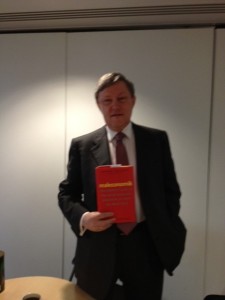On the Tube in the past couple of days, I’ve spotted an intriguing mix of books being read by fellow passengers (real books, that is):
[amazon_link id=”0521007771″ target=”_blank” ]The Cambridge Companion to Merleau-Ponty[/amazon_link]
[amazon_link id=”0091867770″ target=”_blank” ]Round Ireland with a Fridge[/amazon_link] by Tony Hawks
[amazon_link id=”074758589X” target=”_blank” ]A Thousand Splendid Suns[/amazon_link] by Khaled Hosseini
[amazon_link id=”0099502232″ target=”_blank” ]The Associate[/amazon_link] by John Grisham
[amazon_link id=”B005MJFA2W” target=”_blank” ]Thinking Fast and Slow[/amazon_link] by Daniel Kahneman
I’m still reading [amazon_link id=”1594482675″ target=”_blank” ]The New Kings of Nonfiction[/amazon_link] edited by Ira Glass. There’s a classic Malcolm Gladwell essay about the six degrees of separation and Granovetter’s strength of weak links idea. It contains the line: “Poverty is not deprivation; it is isolation,” which must be true.
There were of course lots of kindle etc readers on the Tube so I couldn’t see what they were reading, but as it turns out that e-readers explain the success of the smutty ‘Fifty Shades of Grey’ series, that’s what I’m going to assume was keeping them all occupied on their commute, rather than the philosophy of Merleau-Ponty.
[amazon_image id=”0521007771″ link=”true” target=”_blank” size=”medium” ]The Cambridge Companion to Merleau-Ponty (Cambridge Companions to Philosophy)[/amazon_image]


